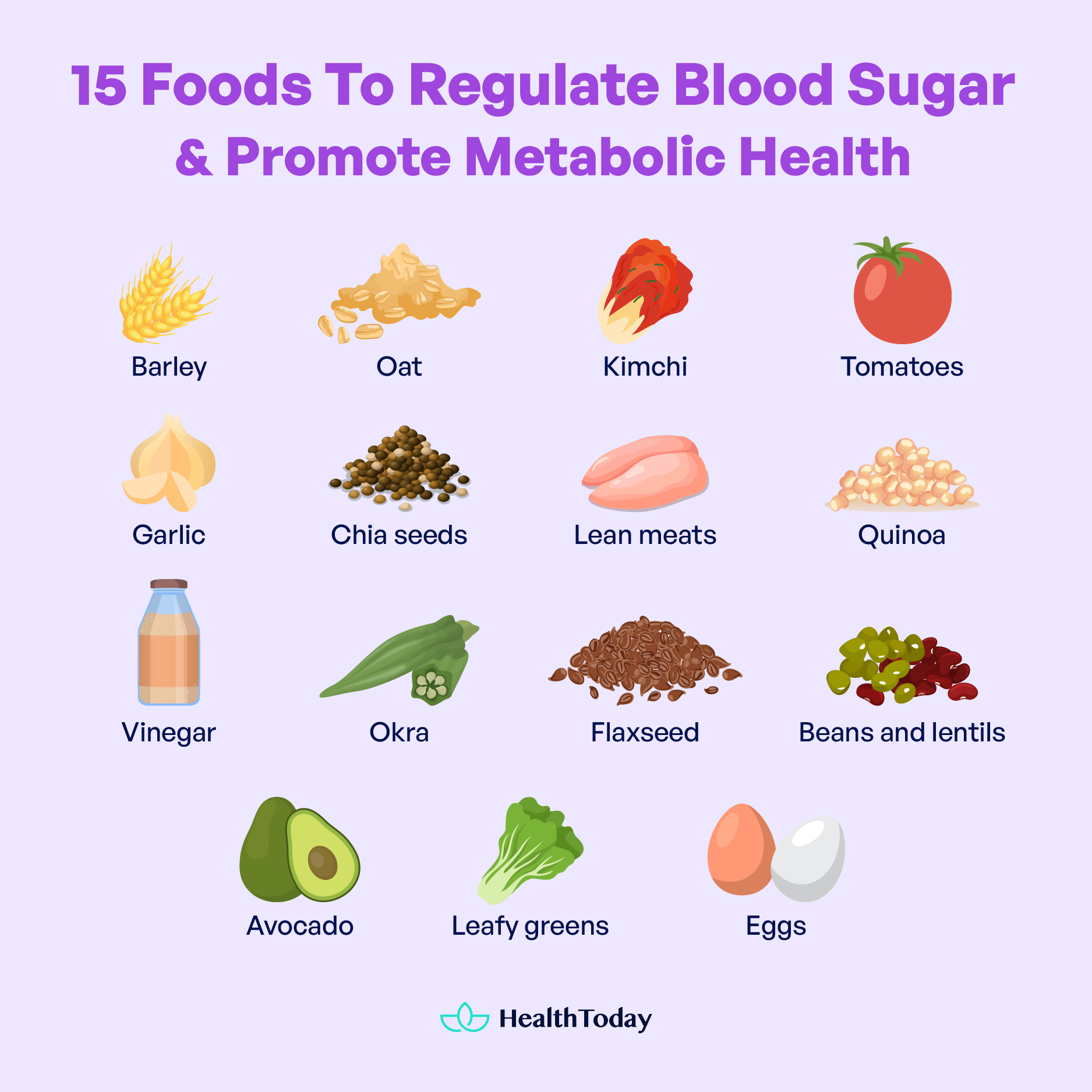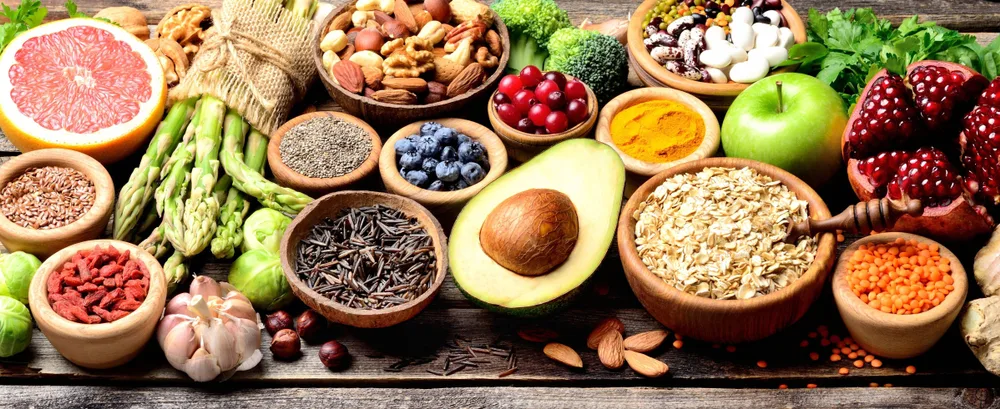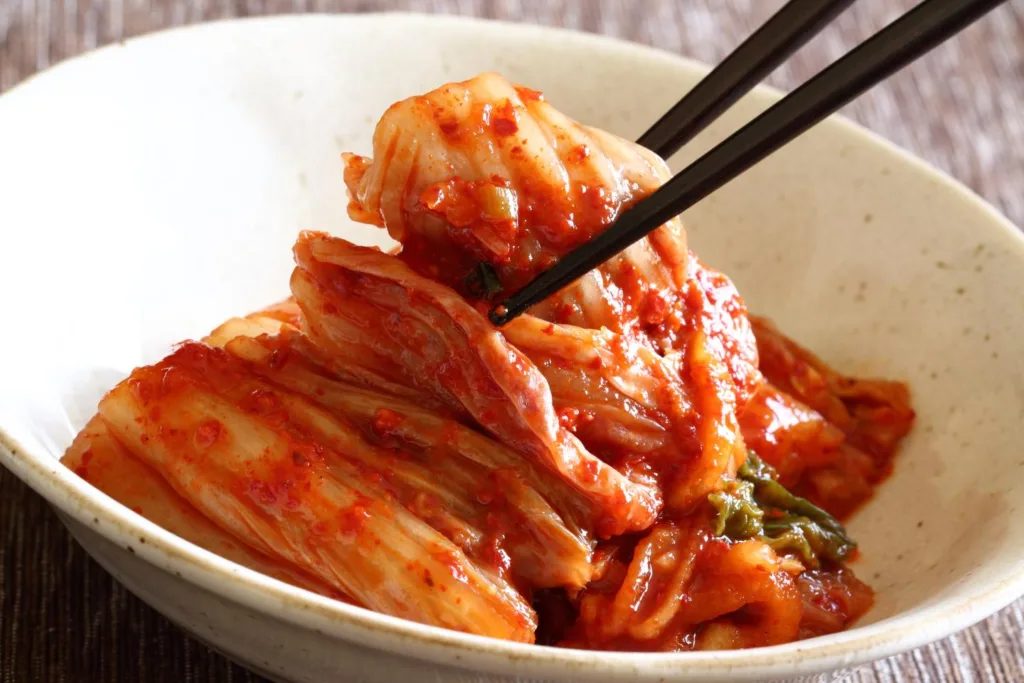Table of Contents
Blood glucose control is a primary concern of metabolic health. It is important, therefore, to understand which foods help in promoting healthy blood glucose levels.
Foods composed of refined carbs, processed sugars, added salt, and saturated fat can all wreak havoc on metabolic health. These foods can increase blood sugar, inflammation, hypertension, cardiovascular diseases, and weight gain while compromising microbiome health.
Adding in whole, nutrient-dense foods are foods that don’t raise blood sugar, and nourish the body, and support metabolic health is recommended. Let’s explore what foods help lower blood sugar and support metabolic health.
Best foods that help regulate blood sugar & promote metabolic health
Natural whole foods such as diverse fruits, vegetables, legumes, nuts, and seeds packed with fiber, vitamins, and minerals. Besides, these foods also provide sustainable energy for your metabolic health. To maintain a balanced diet, it’s important to include nutrient-dense, unprocessed, and unpackaged foods in your daily diet.
Incorporating foods that help to stabilize and lower blood sugar with modest amounts of protein and healthy fats is also vital (1).
Here is a list of top foods that can help you regulate your blood sugar while supporting your metabolic health:

Barley
Barley contains insoluble and soluble dietary fiber, i.e., β-glucan, which aids in reducing blood sugar levels. This fiber increases viscosity in the stomach and small intestine, which results in delayed emptying of the stomach; therefore, it reduces hunger pangs and slows down nutrient absorption (2). Research has shown that barley is good for people with type 2 diabetes and healthy people as it can suppress blood glucose and elevated serum cholesterol levels (3).
Oats
Studies show that oats lower blood glucose and serum cholesterol. Like barley, oats increase the viscosity in the stomach and small intestine, making the contents of the stomach thicker and aiding in the slow release of glucose into the bloodstream (2, 4).
The extent of food processing modifies the nature of the final product’s physical, nutritional, and sensory profiles. Change in carbohydrate structure defines its rate of sugar release in the blood, fast or slow. Highly processed snacks such as chips, ready-to-eat meals, cakes, and cookies will lead to blood glucose rises swiftly over a short duration. Meanwhile, consuming whole grains or legumes with their outer covering, called bran attached, has been shown to release glucose steadily and aid in managing diabetes more easily.
With this in mind, consuming less processed oats or barley will help lower blood sugar levels. The fat content of oats does not influence blood sugar significantly because it is very low.
Kimchi
Kimchi is a traditional fermented food (cabbage) that has been shown to induce favorable metabolic health effects (5). Kimchi consumption has been demonstrated to exert anti-inflammatory effects, improving lipid metabolism, fasting blood glucose, and other biomarkers of metabolic health. This functional food has also been shown to improve the quality and diversity of the microbiome, which is foundational to metabolic health and blood sugar regulation.
Tomatoes
Tomatoes contain nutrients such as lycopene, beta-carotene, folate, potassium, vitamin C, flavonoids, and vitamin E. Studies find that tomatoes and tomato juice have a low glycemic index and decrease oxidative stress biomarkers because of their lycopene component. According to USDA, 100g or 4-5 medium-sized Roma tomatoes contain 3.84g of carbohydrates and 1g of fiber (6, 7).
Garlic
Garlic is beneficial for humans as it is antimicrobial, antioxidant, anticarcinogenic, antimutagenic, anti-asthmatic, immunomodulatory, and packed with prebiotic effects. The active compound in garlic, allicin, can increase insulin levels and aid in reducing blood sugar levels (8).
Chia seeds
Chia seeds are edible and nutty flavored. They are oval-shaped with black and white spots. A study published in Diabetes Care reported that these seeds improve blood sugar and reduce the risk of heart disease in type-2 diabetes patients (9).
Another research in 2020 stated the effect of chia flour and chia oil consumption on glucose metabolism in the liver under insulin resistance conditions, which can decrease adiposity or body fat. Only chia oil improved glucose and insulin tolerance.
Lean meats
Lean meat sources are low in carbohydrate and fat content. Protein-rich foods such as fish, chicken, grass-fed meat, farm fresh salmon, and seafood are great choices.
For instance, poultry is a good source of selenium, vitamin B3, vitamin B6, and choline (10). Whereas, salmon is an excellent source of protein, B12, and anti-inflammatory fats.
Studies suggest that lean meat can improve the glycemic and insulinemic response. One oz of chicken (dark meat), turkey (dark meat), salmon, swordfish, lean beef, or pork, has approximately 3g of fat and 55 calories, whereas 1. oz of turkey breast or chicken breast, fish filet, shellfish, or egg whites that fall under the very lean group, consists of 1g of fat and 35 calories (11).
Quinoa
Quinoa belongs to the amaranth family and is a flowering plant rich in protein, especially all nine essential amino acids, fiber, B vitamins, phytochemicals, and minerals. It is gluten-free, easy to cook, and can reduce blood glucose (12).
Scientific literature from the National Library of Medicine (2016) found that quinoa offers benefits in managing diabetes because it can help stabilize blood glucose levels. However, its serving size should be carefully measured as overconsumption in a day may increase your blood glucose level (12).
Vinegar
Vinegar has been known for centuries for its various health benefits, including glucose management. Studies found that consuming vinegar can aid in sugar level control in people with type 2 diabetes. Besides, consuming vinegar before sleeping at night may help control the rise of blood glucose in the morning in type 2 diabetes. It is attributed to reduced starch digestion and/or delayed stomach emptying (13). Apple cider vinegar can also help in breaking down macronutrients into nutrients the body can utilize.
Another study reported that vinegar reduces postprandial hyperglycemia, hyperinsulinemia, and hypertriglyceridemia without affecting lipolysis (14). Postprandial hyperglycemia reduction means that vinegar reduces the highest blood sugar level that rises after a meal. Hyperinsulinemia means a high amount of insulin in the blood. And hypertriglyceridemia means high levels of triglycerides.
Okra
Okra is called a vegetable but is also a fruit because it has seeds. It is low in calories and contains almost no fat. Okra is a good source of fiber, which helps reduce blood sugar levels. Okra is also loaded with vitamin C, vitamin A, and zinc. Compounds in okra that are flavonoids like quercetin-3-O-gentiobioside, quercetin-3-O-glucoside (isoquercitrin), and polysaccharides such as rhamnogalacturonan have shown antidiabetic effects (15, 16).
Flaxseed
Flaxseeds are seeds that contain phytochemicals, omega-3 fats, and fiber. Research has shown that they improve digestion and reduce the risk of heart disease, type-2 diabetes, and cancer. They also help lower blood glucose and stabilize diabetes management (17, 18).
100g or ten tablespoons of flaxseed contains 548 calories of energy, 35.5g of total fat, 19.4g of protein, and 25.8g of total dietary fiber (17).
Beans and lentils
People consume beans and lentils regularly in different diets across different cultures. Beans and lentils provide a good amount of protein, amino acids, fiber, and minerals. Despite a high amount of carbohydrates, beans and lentils aid in reducing blood sugar, lowering the risk of developing heart problems, and lowering the chances of developing prediabetes due to their high soluble fiber and low fat content (18).
Avocado
Avocados are rich in healthy fats (unsaturated fatty acids), vitamins, minerals, and fiber. They help reduce blood glucose and protect against metabolic syndrome, including high blood pressure (19).
Avocados can be used in many dishes, such as in a salad, on your eggs, or in a healthy smoothie.
Leafy greens
Leafy greens are rich in a diverse array of vitamins, minerals, antioxidants, and fiber that support countless aspects of health. Plants such as spinach, romaine, and kale also include phytonutrients that support the modulation of inflammation, metabolic health, and digestive health, as well as regulating the gut microbiome (20). Furthermore, leafy greens contain folate, which supports the body by properly methylating and getting rid of what the body does not need.
Eggs
Eggs are a rich source of nutrients. They contain protein, healthy fats, vitamins, minerals, and antioxidants; while being low in carbohydrates (21). While egg yolk contains cholesterol, modest amounts can support our brain health and metabolic health. Eggs are also a great source of Choline, supporting the body’s methylation cycle, which is important for metabolic health, among many other processes.
Tips to choose foods that stabilize blood sugar
Digital marketing through media nowadays has shaped our way of looking at many foods and drinks, such as sodas, pops, sauces, breakfast food, desserts, and chocolates in foods that are convenient, ready to cook in two to five minutes, or ready to eat. Although it sounds very attractive, these highly processed foods are rich in salt, sugar, fat, or refined wheat flour, which are unhealthy, especially for people with diabetes.
Here are a few tips for shopping a low sugar foods list that can help you in your diabetes management journey:
Healthy drinks
Look for healthier beverages such as water, unsweetened sparkling water, herbal teas, black or green tea, and coffee.
Low-sugar snacks
Any seasonal fresh fruit, Greek yogurt with cinnamon (helps to make metabolism active), baked fruits with low sugar, almond milk beverage instead of cream, and dark chocolates.
We all love ketchup, barbecue sauce, and sweet chili sauce. However, you can replace them with sauces labeled as having no sugar or make your homemade dipping sauce using hung curd and any natural herb as flavor.
Checking label
- Avoid breakfast cereals as they are unnecessarily sugary and high in refined carbohydrates and increase your cravings to munch more during the day.
- Always read labels before buying any snack to avoid excessive sugar and salt intake.
Full-fat foods
In general, most of us have been told that low-fat varieties are healthier. However, truth be told, it is always better to consume a full-fat variety of food. For example, 170g or 2/3 cup of low-fat vanilla yogurt contains 24g of sugar and 104 calories (23). Meanwhile, yogurt, plain, and whole milk contain 4.09g of sugar and 78 calories (24). Additives can also be added to low-fat or fat-free options that can further compromise metabolic health.
Whole foods
Buy whole foods, such as local farm fresh meats, vegetables, and fruits, from your nearby farmers market if possible. Performing all the preparation activities, such as washing, peeling, chopping, and cooking, can become fun and add appreciation to your meal. Adding species such as turmeric can make your foods tastier while providing anti-inflammatory and metabolic health benefits.
In general, these tips can help you select healthier foods and refrain from your favorite snacks such as muffins, chocolates, donuts, and sodas.
You can be creative and prepare some easy, fun, and healthier alternatives from the good foods mentioned above with these suggestions:
- Make diabetes-friendly recipes for smoothie snacks (25)
- Celery sticks dipped in nut butter
- Hard-boiled eggs
- Raw vegetables with hummus
- Apple slices with peanut butter
- Sprouted lentils with chopped onion, tomato, salt, and herbs (26)
- Avocado toast
- Tuna salad
Does protein lower blood sugar?
Yes, researchers have reported that protein eaten along with other foods aids in lowering and controlling blood glucose levels.
Does pairing foods matter in terms of blood sugar levels?
Yes, consuming veggies first, followed by protein, fat, and then carbohydrates can support healthy glucose metabolism.
Does sleep and intermittent fasting help?
Adequate sleep and Intermittent Fasting (IF) have also been well supported in the literature for improving metabolic health, as both of these processes aid the body in digestion and detox, while promoting microbiome health and circadian rhythm balance.
Do blueberries lower blood sugar?
Blueberries are rich in fiber, antioxidants, vitamins, and minerals. Research has shown that eating them does help in lowering blood glucose.
What are foods that fight diabetes?
Foods rich in protein and fiber easily provide satiety for a long time and help manage diabetes.
Is broccoli good for high blood sugar?
Yes, broccoli is rich in fiber, antioxidants, vitamins, and minerals, which help in reducing blood glucose levels. Broccoli also supports detoxification pathways in the body, further supporting metabolic health.
Summary
Now you know what foods help lower blood sugar and what food you should avoid to achieve optimal metabolic health. Compromised metabolic health can be managed with optimal eating habits and consistent exercise. It is vital to monitor the foods you are eating, physical activity, and body weight to avoid symptoms of high blood sugar levels.
Adding whole foods and nutrient-dense foods such as fruits, vegetables, legumes, nuts, and seeds into your daily diet is a great way to stabilize your blood sugar levels.

















Comments
0